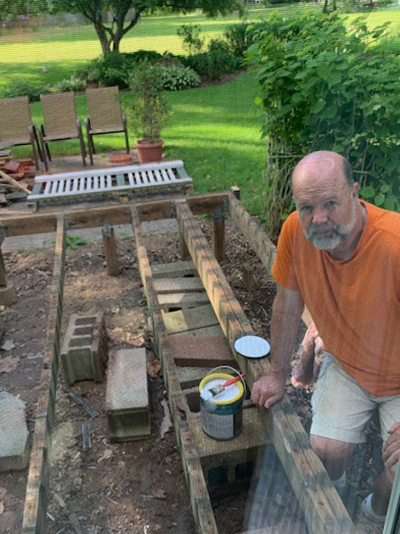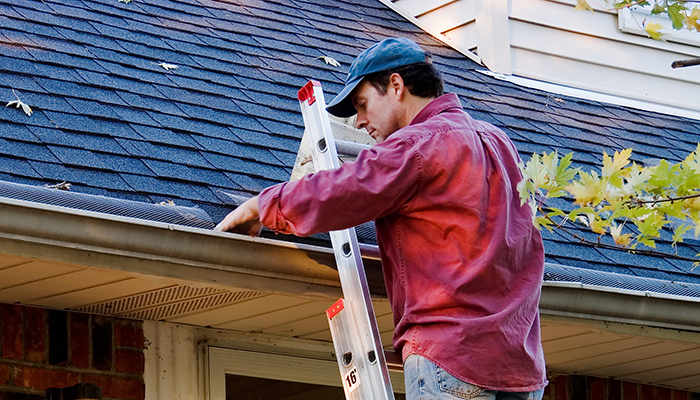If you want to become THE local expert on aging in place, you might want to consider adding a home modification service. This can be as small as putting up grab bars and fixing broken stairs, to a monthly maintenance contract, or coordinating full remodels for all-on-one-floor living.
A home modification service is one of the top four trends I see for care managers in 2023.
[Check out our marketing support materials for Aging in Place, including a presentation and monthly blogs for proactive planners.]
Meeting unmet needs
Often it starts out as a simple handyperson service. A client needs a grab bar installed. A care manager asks her good-with-tools husband if he could do this, and then it evolves. He enjoys being part of her business, and the company benefits because they can offer wider support. (Forgive the implied gender stereotypes here. Not meant to be limiting. This is simply how I’ve seen the service start and grow.) The client can stay at home longer, maybe relinquish some of the chores that have just gotten to be too much (e.g., cleaning gutters, changing lightbulbs), and the home is safer in terms of preventing falls. It even retains its value when the cycle of deferred maintenance gets interrupted.
Connect with an OT (occupational therapist) or PT (physical therapist)
These professionals are trained to recognize special needs and can make important suggestions, even for something that seems as “simple” as a grab bar. Their services can be covered by Medicare so no cost to your clients. And what a great opportunity for networking and reciprocal referrals!
Surprising benefits
In many ways, a home modification service is a very practical outgrowth of the kinds of things you already do on the direct-care front. One care manager named their program, “Home Repair Concierge.” Another care manager I spoke with said that their home modification service helps extend clients’ trust in the company. Clients realize they can ask for help for things that might not have seemed “standard” for care management: Assembling an IKEA bookshelf or building a potting shed for work in the garden. The company not only diversifies its revenue stream, but gets embedded more thoroughly as the go-to service when the client or family needs help.
I have frequently heard a joke that care managers are “the other daughter.” In the same lighthearted vein, adding home modification completes the picture by adding “the other son.”
Interview with Inspire Care of Central New York
I spoke with Pete Auyer of Inspire Care of Central New York, a care management company in the Syracuse area, to learn more about their home modification program.
TASHA: What tips would you recommend for a care management company just starting out with a home modification service?
PETE: By nature, our profession is one of helping others. The balance is knowing what you know, what immediate resources you have, and knowing when to call on other providers that will protect your business and your client. In that light, here are some thoughts I have for those just starting out:
 Written agreements. At a minimum, document the intended tasks (the scope of work), estimated costs for supplies, and the fee for your time.
Written agreements. At a minimum, document the intended tasks (the scope of work), estimated costs for supplies, and the fee for your time. - Make sure your client knows the worker’s qualifications (license, certification, or lack thereof). Best to have references confirmed for quality of work and timely completion.
- Confirm that your business insurance covers the services you are going to provide.
- Know what you or your staff really can and can’t do well. Whoever is doing the work needs to be up to date on local building codes (interior and exterior) and when a permit is required.
- If you are coordinating the work of others, do your due diligence about verifying the contractors’ license, insurance, bond, references, and official complaints lodged with the state contractor board.
- Leave the installation and repair of dishwashers, washing machines, etc., to the dealers. This protects the client by ensuring the warranty remains in effect. There’s still a role for you. The client may wish to hire you to coordinate with the dealer or to be there on the day of installation or repair to be sure all goes according to plan.
Pete’s situation is unique in that he had been a project manager for a landscape architectural firm for more than twenty years. He was well versed in large projects and knew exterior remodeling—ramps, lighting, walking surfaces—very well. His wife, Becky, is a physical therapist and does home safety assessments as part of her care management practice. Pete and Becky worked together on home modifications when they were caring for their aging parents. They enjoyed the process of working together very much.
When Pete retired, they decided to launch their Aging Well HomeAssessment program so they could market it as a differentiator. It’s become very popular with a new clientele: Proactive planners—currently well, older adults who are evaluating the logistics of aging in place. It also makes an easy-to-understand package to present to referrers.

TASHA: Tell me a bit about your approach to larger projects.
PETE: There’s quite a call for remodeling. Sometimes it’s boomers evaluating what it will take to age in place so they can plan proactively. Recently we’ve noticed a trend in remodels so parents can move in with their kids, for instance, building a “granny unit,” or converting a large family home into a duplex. We also get calls from the adult daughters and sons who are worried that their parent’s house is just not set up to keep mom and dad safe. In this case, it helps that Becky is a physical therapist. We do a top-to-bottom assessment for safety, as well as for potential problems we see waiting in the wings. We make a full list of must-do, nice-to-do, and down-the-road modifications. A holistic assessment approach benefits clients in the short and long term.
We give clients the contact information for a few contractors we have vetted. Or the client may hire us to serve as the project manager and make the contact on their behalf. We have prepared Requests for Proposals for larger jobs that require specific needs, pricing, and agreeable completion dates. We happen to have the expertise to do this.
Ideally, we get two to three estimates and have the client meet with each contractor when they come out to assess the job. We help the client or their children evaluate the estimates, apples with apples.
Once a contractor is selected, we review the contract and confirm the scope of work, price, start/stop dates, and impact on living space during construction. If we are hired to coordinate, we keep an eye on costs and make sure the contractor keeps their appointments. We prevent unnecessary upselling and monitor to be sure the hours on the bill match the hours the person was actually on the job.
A subscription maintenance service

Another home modification business model is a subscription service. This can involve one-off jobs like installing grab bars, but is more about the routine maintenance that otherwise can result in older adults doing things they shouldn’t be doing: Climbing ladders or lifting heavy objects, for example. At a minimum, the focus is on safety and fall prevention.
Many older adults have been living in the same home for thirty to forty years. Deferred maintenance may be taking a toll, not to mention normal wear and tear over the decades. A subscription service provides for someone to come out to the house on a regular basis to perform agreed-upon tasks. This may be yard maintenance and small repairs, help moving a piece of furniture, or hanging a mirror. There could be seasonal jobs such as cleaning air filters in the furnace, preparing for winter, or checking the hot water heater. In addition to comfort and safety, adult children might value this type of service because it helps to maintain the estate’s key asset: The family home.
If you are interested in a service of this nature but want a leg up, there is a national franchise called Tru Blue Total House Care that is adding locations throughout the country. Their business model includes partnering with senior care providers. (Many of their franchisees began in the senior care industry.) It might be worth giving them a call to see if you can work with them in one context or the other. Who knows, you might become your area’s licensee!
If you want to become known as the local aging in place expert,
give us a call at (707) 364-5285.
Consider our marketing packages
to help you network with referrers,
reach out to families and
connect with proactive planners.
We’d love to support you!




